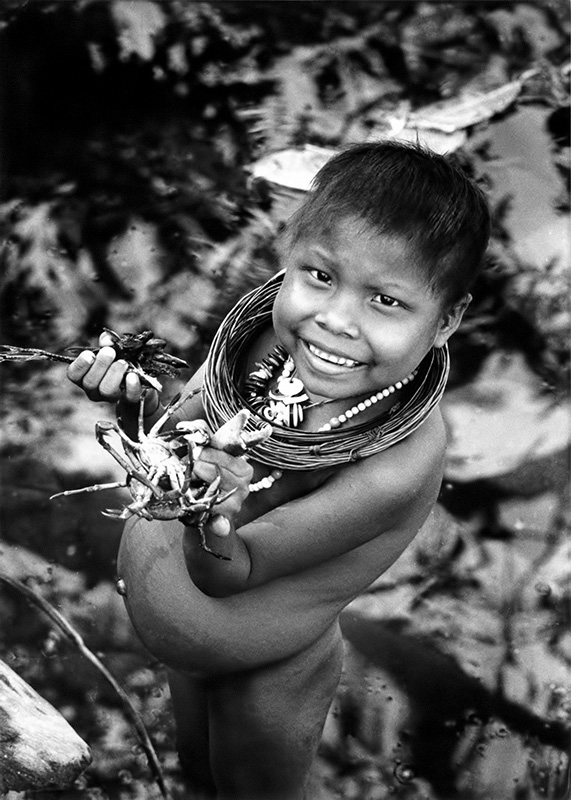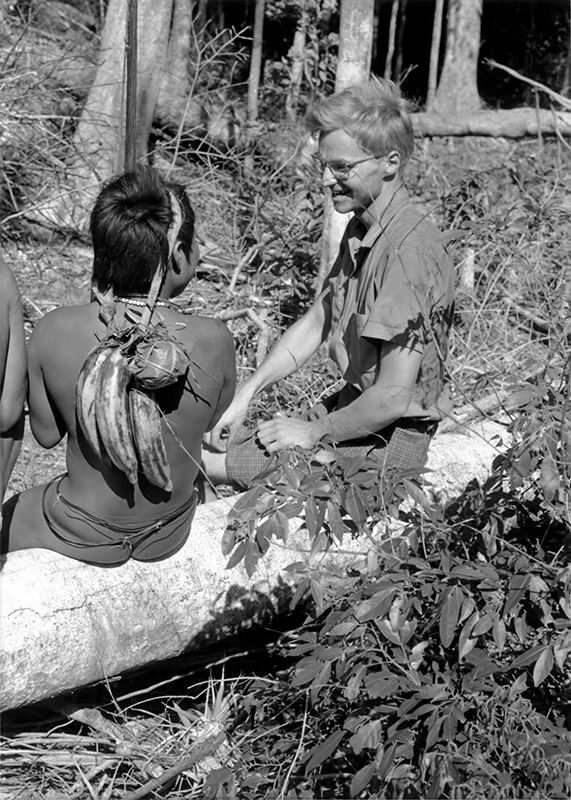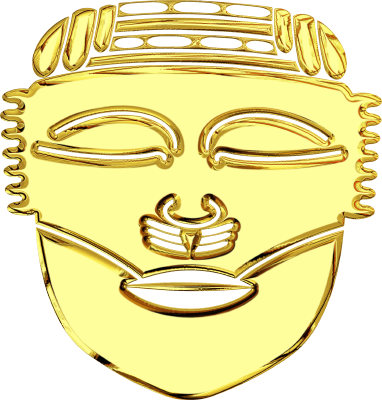


By the end of the first night of his hunger strike, Franco came to me saying, “Oh, my friend, I'm so hungry! I can't stand it! You've got to bring me something to eat. Can you sneak me something from your dinner? Don't let the guerrillas know, whatever you do!”
By this time the guerrillas gave me a little more freedom to move around in the camp, so I was able to slip most of my dinner into a plastic bag and hide it under my shirt until I could pass it to Franco later that night. He waited until he was in his hammock and wolfed it down. This went on every day of his so-called hunger strike. And he was always ravenous, so it got to the point where I was starving to death because Franco couldn't get by on less than my full ration of food.
Eventually, the guerrillas started to worry about Franco's health. One of them asked me, “Do you think he might die? How long can he live without food?” Most of the guerrillas had mixed emotions about it—they didn't want to lose their ransom, but at the same time, they fervently wished to be rid of him.
Finally, a responsable came to me and said, “Franco's hunger strike has lasted two weeks now. Can you do something to make him eat? We're getting tired of this. He's driving us crazy. We've decided to just go ahead and execute him if we can't get him to cooperate. After all, he wants to die from starvation, so it will shorten his suffering if we shoot him now.” I decided humor might be the best solution to Franco's problem. “Don't worry about Franco,” I told the guerrilla. “I'm the one who's starving—he's been eating all my food!” The guerrilla laughed uproariously as I described how Franco had been getting plump while I wasted away from his hunger strike. It became something of a camp joke—though Franco never knew about it. After this, every time Franco announced another hunger strike, they gave me two dinners—one for me to “sneak” to Franco to keep him happy, and another for myself. We survived all four of his long hunger strikes this way. Franco was eventually released.
But not all of the hostages fared so well. Many were executed—especially between February and June.
It was during this time, too, that the responsables started to clamp down on me in a concerted effort to force a public “confession” of my crimes against humanity.
I refused. “I've done nothing,” I told the guerrillas. “You're asking me to lie. I have to tell the truth.”
“Then we'll kill you,” they said.
“The truth is a good thing to die for,” I told them. Then I looked each of them in the eye and said, “I can only die once. But you, my friends, will die a thousand times because you'll know you've killed an innocent man.”
After that, the responsables decided to pull out all the stops, trying everything imaginable to break me. I wondered how human beings could subject other human beings to such cruel, inhuman treatment.
They tried to break me psychologically first, using an assortment of ploys. “The Indians have totally abandoned you,” they told me over and over. “We've talked to them, and not a single one of them cares whether you live or die. You might as well save yourself because nobody else will.”
I didn't want the Motilones to make any rescue attempts, of course, but I couldn't believe they would abandon me completely. Surely they remembered our 28 years together. Surely they would continue the work we'd begun in the jungles whether I survived or not; it was, after all, not my work, but theirs, and God's. They could not forget that. As the guerrillas repeated their assertions again and again, however, I began to have small doubts. Was it possible? Had I been abandoned?
But by far the worst moments of my captivity came when I had to watch the executions of the other hostages—people who had become friends. As their bodies were ripped apart by the guerrillas' bullets I was told, “This is what will happen to you unless you sign a confession.” The experience was inexpressibly painful.
The variations of torture the guerrillas invented were remarkable. Many things that happened during this time were so terrible that I will probably never be able to talk about or forget them.
But there were moments as well that will stay with me forever because of their inexpressible beauty. These were not at all what you might expect—not spectacular moments, or even dramatic moments in the normal sense of the word.
Once, for example, during the latter part of my captivity, I suffered a severe attack of diverticulitis—one of several attacks that involved severe hemorrhaging. I lost about two quarts of blood this time, was in excruciating pain, and eventually lost consciousness. When I awakened I was being examined by a doctor the guerrillas had brought into the jungle. He said only a blood transfusion could save my life.
Immediately a fight broke out among the guerrillas over who would win the “honor” of giving their blood for me. A young Christian guerrilla was one of those chosen. After the transfusions were completed, he sat with me for a while. “My blood now flows in your veins, Papa Bruchko,” he told me. There were tears in his eyes. And in mine, too.
Later that night I awakened in terrible pain. I tried to separate myself from it, but this time I couldn't. I was too weak, too exhausted. I felt empty and hollow, and the intensity of the physical pain increased my enormous sadness over the things I'd experienced in the previous months. There was no comfort for me, I thought. None. I had never experienced such total anguish.
Then an absolutely amazing thing happened: A bird known in Colombia as the Mirlo began to sing. I looked up and saw the full moon pouring down through the thick jungle vegetation and felt, inexplicably, that it was shining for me. The Mirlo's song was the most hauntingly beautiful sound I'd ever heard. As I listened, I wondered why it seemed so familiar, why it soothed me so deeply.
The bird's song soared through the damp, moonlit air as I clung to consciousness.
The music was incredibly complex, set in a minor key. The notes never repeated; they reminded me more and more of something achingly familiar, something comforting—but I just couldn't put my finger on it. An ancient Aramaic chant—was that it? Yes, it was reminiscent of that—but why did it make me think of the resurrection of Christ?
The familiarity puzzled me, but I had no real need to understand it. The music was the most exquisite I had ever heard; I was sure of that. It was communicating something profound to me, something I needed desperately but couldn't identify. I let the song carry me for a long time. Then I lost consciousness again.
When I came to, the bird was still singing. I wondered whether I might be hallucinating. After all, everyone knew Mirlos never sing at night. And I was desperately ill, barely hanging on to life. It wouldn't be unusual to hallucinate in my condition. But what I was more intent on trying to understand was why this song—real or imagined—was having such an amazing, restorative effect on my spirit. I could feel myself coming back to life with each note.
Then, as the bird's song continued to penetrate the quiet night air, I knew: I knew why this song seemed so hauntingly familiar, why it spoke to me of the resurrection, and why it comforted me like familiar, loving arms. The Mirlo was singing a Motilone minor-key tonal chant, mimicking the traditional sounds with such amazing accuracy that I could almost hear their words, could almost see my friends Kaymiyokba and Waysersera and all the other Motilones I loved, singing the prophecies of the resurrection of Christ in the timeless Motilone way, our hammocks swaying together in the rafters of a communal home in the jungles as they had for the 28 years I'd lived among them. I could almost feel their warm, reassuring hugs.
At that moment I was lifted above my agony in a way I'll never be able to describe adequately. I didn't even care whether it was real or imagined. The Motilones were with me; I knew it now. I had not been abandoned. And I was going to survive to be with them again because God had used Mirlo's song to transfuse His lifeblood into me.
One of the guerrillas walked over to my hammock as I opened my eyes at dawn. The pain was subsiding a little.
“So,” he said softly, “how did you like your personal concert last night?”
I questioned him with my eyes. “The Mirlo,” he said. “His song kept us awake all night long. We've never heard anything like it! The boys wondered whether it was a special angel sent to sing for you. Did you hear it?”
One day in July I was brought before a responsable and told that since I could not be convinced to sign a confession, I would be executed. He gave me three days to prepare myself for death.
There was nothing special I needed to do, I told him, so why didn't they just get it over with? I was ready.
But no, I had to wait the full three days. So I spent them doing exactly what I'd been doing for nine months—teaching, cooking, going about daily life as usual. The guerrillas watched me closely during this time. I wondered what they were thinking.
By this time about 60 percent of them were Christians. The responsables would have a hard time finding someone to shoot me. Even those who weren't Christians had become my friends. I worried about them but knew that God would complete the work He had begun in all their lives. I had done what I came here to do, and I would die without regret.
On the day of my execution, the responsable ordered me tied to a tree. They read the formal charges against me and declared that I had been sentenced to death by the “people's court.” I didn't want to be blindfolded. I looked into the faces of my executioners and saw that many of them had tears in their eyes.
Then they raised their rifles and the order was given. Shots rang out. I waited for the impact of the bullets. But I felt nothing.
The guerrillas looked at me with amazement. Then they examined their rifles and said, “These are blanks!”
It had been one final attempt to break me. But it hadn't worked.
The next morning Federico, one of the guerrilla leaders, came to me and said, “Bruce Olson, I have good news for you! You're being released. Are you happy?”
I shrugged. “I'm indifferent,” I said. “My concern is for the Motilone people, the solidarity of their territory, and the continuance of the programs that are so vital to their future. What about them?”
“Yes, yes, we understand your commitment,” Federico assured me. “We made an error when we kidnapped you. The charges against you have been dropped. It's an embarrassment to us that you've been held in our camps. If we've mistreated you we hope you can find the greatness within you to forgive us. We've decided to leave the Motilones as an autonomous people. We will leave them alone, and you may continue your work among them as before.”
I was incredulous. “Are there conditions to my release?”
“You are released without conditions,” Federico said. “Now are you happy?”
“I am, indeed.”
Federico's eyes actually filled with tears. Then he hugged me.
Two weeks later, after a long trek back to civilization through the jungles and rivers, I was finally released. That's when I discovered, to my total astonishment, that the whole world seemed to know about my captivity.
The Motilone people and all the other Indian tribes in Colombia had joined hands in support of “the man who is our brother, our friend,” threatening total war with the guerrillas unless I was released. And the media had taken up their cause, running hundreds of front-page stories in every newspaper in the nation. The entire Colombian population had then followed suit, rising up as a single voice to denounce the guerrillas for what they were doing.
“How can these criminals claim to speak for 'the people' and then kidnap a man who has done more for the indigenous people of this nation than anyone else?” they asked. “It's an outrage!”
The presidents of both Colombia and Venezuela welcomed me back to the world. “You are a national emblem,” President Barco told me. “For the first time in history, Indians defended a white man. Their cause has united the Colombian people and given them the courage to fight against the tyranny of terrorism.”
Shortly after my release, the Motilones organized a meeting with leaders of all the other Indian tribes of Colombia. Together, they issued an ultimatum to the guerrilla forces and drug traffickers operating in their lands: “You have until December to clear out. If you don't go, you will be at war with all 500,000 of us.” The guerrillas' numbers are small, though their weapons are large. War with the Indians would be a no-win situation. I think they will have no choice but to leave.
In the weeks since my release, the drug war has exploded in Colombia. I've followed the news of the deaths and wholesale destruction with great sorrow. But I'm also filled with pride. The Colombian people show a new determination, it seems, new courage to stand up to the drug lords of the Medellin cartel.
Why is it only now—after all the years the drug lords have been able to do whatever they liked in Colombia—that the people have decided they will fight back?
I remember the people on the streets of Bogota who welcomed me home saying, “We're inspired by the example of the Motilones and their courage. We will no longer tolerate these criminals out of fear for our lives. We'll stand up to them!”
I don't think it's a coincidence that this is exactly what's happening in Colombia at this moment. Perhaps the Motilones' part of God's orchestration in Colombia will not be noticed by many, but I believe it is real and significant. I pray that it will continue.
Several people have told me since I've arrived in the States, that my release was the greatest victory they'd ever experienced. This surprised me. Naturally, I'm thankful for many things—especially that I'm alive and free to continue my work among the people I love. I'm thankful for the guerrilla lives that now belong to Christ and will continue to be conformed to His will. I'm thankful, too, for the oneness of spirit that's drawing the people of Colombia together for the first time in many years. These are victories, of course. And there are many others I could mention.
But for me, the greatest victory of all lies in the sweetness of the moments when I caught glimpses of the “subscript” in God's complex orchestration of lives and events. In those moments I knew that He was quietly working out His sovereign will, not only in my life, but in the lives of everyone involved: the Motilones and other tribal peoples, the people of Colombia, the guerrillas, and indeed, as I'm now discovering, people all over the world.
In those moments, I knew—even before my captivity ended—that the greatest victory of this long drama would not be found in my release. It would be found, instead, in the song of a Mirlo in the moonlight.
Bruce Olson has been a missionary to the Motilone Indians in Colombia since 1961.














